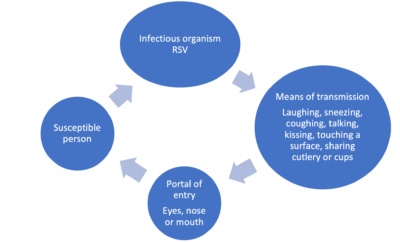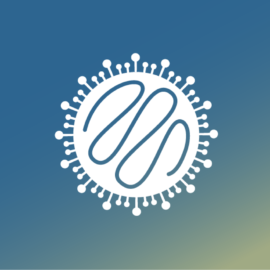About RSV
Respiratory Syncytial Virus (RSV) is a common virus which is very contagious and infects most children before they turn two years of age.1,2 RSV affects the lungs and breathing passages. Children under 12 months of age are the most likely to develop serious illness. RSV prevention is within near reach.
-----------
1. Government of South Australia SA Health. Respiratory syncytial virus (RSV) infection – including symptoms, treatment, and prevention. Last updated 02 April 2022
2. Emergency department, Queensland Children’s Hospital. Respiratory Syncytial Virus (RSV) Reviewed February 2022
RSV Symptoms
RSV starts off with mild cold-like symptoms which may include slight fever, sore throat, headache, and a runny and stuffy nose. Bronchiolitis and pneumonia often follow in young children.
Bronchiolitis is inflammation and congestion of the small airways of the lungs known as the bronchioles. Symptoms may include coughing, wheezing, difficulty breathing and problems eating or drinking.
Pneumonia is an infection that inflames the air sacs of one or both lungs. Symptoms will also include fever, coughing and trouble breathing.
Death in people under 16 years of age from RSV is rare in high income countries like Australia.
People with RSV are generally contagious for three to eight days. Some infants and people with impaired immune systems may be contagious up to four weeks after symptoms subside.3
Most people recover from the infection within ten days.4
-----------
3. Centers for Disease Control and Prevention: RSV transmission page last reviewed 18 Dec 2020
4. Government of South Australia SA Health. Respiratory syncytial virus (RSV) infection – including symptoms, treatment, and prevention. Last updated 02 April 2022
How RSV Spreads
The organism that causes RSV infection is a virus called Respiratory Syncytial Virus.
Chain of infection

An infected person can pass the virus onto others by laughing, sneezing, coughing, talking, or touching a surface.
A susceptible person can pick up the virus through the eyes, nose, or mouth from an infected person who has coughed or sneezed into the air. You can also pick up RSV after touching a surface which has the virus on it and then touching your eyes, nose, or mouth.5
-----------
5. Centers for Disease Control and Prevention: RSV transmission page last reviewed 18 Dec 2020
RSV Complications
High risk for young children
RSV can cause serious illness in infants under 12 months of age. Complications can be particularly severe in preterm infants (born at 35 weeks gestation) and in infants who have long term lung and heart conditions.6
High risk for some adults
Older adults (especially those over 65 years of age), people with heart and lung disease, or people with weakened immune systems are at higher risk of complications and hospitalisation. They may develop pneumonia, more severe symptoms of asthma or COPD and congestive heart failure.7
-----------
6. The Royal Children’s Hospital Melbourne. Clinical Guidelines (Nursing); Palivizumab for at-risk patients; Updated August 2021
7. Centers for Disease Control and Prevention: RSV transmission page last reviewed 18 Dec 2020
RSV Prevention
Advise patients/carers that the recombinant respiratory syncytial virus (RSV) can be prevented by various hygiene measures:
- washing your hands with soap and water for at least 20 seconds
- keeping infected people away from others, especially babies and older people
- not sharing drinks, or cutlery with people who have colds
- covering your nose and mouth when sneezing or coughing
- throwing out tissues as soon as you’ve used them
Vaccines
There is currently one RSV vaccine, Arexvy, approved for use in Australia. Arexvy is a recombinant respiratory syncytial virus pre-fusion F protein (adjuvanted) vaccine. It is indicated for the active immunisation of individuals 60 years and older for the prevention of lower respiratory tract disease caused by RSV. The vaccine is administered as a single dose of 0.5 mL for intramuscular injection only, preferably in the deltoid muscle. The need for revaccination has not been established. 8
Monoclonal antibodies
Prevention in high-risk infants
High-risk infants are those that are more likely to develop complications from RSV. They include premature infants or those with heart or lung problems or those that are immunocompromised (have weakened immune systems).
Palivizumab
Palivizumab is an injectable monoclonal antibody indicated for the prevention of serious lower respiratory tract disease caused by respiratory syncytial virus (RSV) in children at high risk of RSV disease. It is given intramuscularly.9 It is directed at a protein in RSV. It has been shown to reduce intensive care unit admission for babies who have been hospitalised for RSV.10
Nirsevimab
Nirsevimab is an injectable, long-acting monoclonal antibody that protects against respiratory syncytial virus (RSV) disease for at least 5 months after a single dose. It is indicated for the prevention of RSV lower respiratory tract disease to protect all infants against severe disease during or entering their first RSV season, and young children aged <24 months who are vulnerable to severe disease during their second RSV season.11, 12
-----------
8. Therapeutic Goods Administration (TGA). (2024, January 22). Arexvy | Australian Prescription Medicine Decision Summary . https://www.tga.gov.au/resources/auspmd/arexvy
9. AstraZeneca Pty Ltd. (2021). Australian product information: SYNAGIS® (palivizumab) solution for injection [Product information]. Retrieved from https://medsinfo.com.au/product-information/document/Synagis_PI
10. The Royal Children’s Hospital Melbourne. Clinical Guidelines (Nursing); Palivizumab for at-risk patients; Updated August 2021.
11. Australian Technical Advisory Group on Immunisation (ATAGI). (2024, March 26) Statement On The Use Of Nirsevimab For Prevention Of Severe Disease Due To Respiratory Syncytial Virus (RSV) In Infants https://www.health.gov.au/sites/default/files/2024-03/atagi-statement-on-nirsevimab-2024.pdf
12.Sanofi-Aventis Australia Pty Ltd. (2023). Australian product information: BEYFORTUS™ (nirsevimab) solution for injection [Product information]. Retrieved from https://medsinfo.com.au/api/documents/Beyfortus_PI?format=pdf
RSV Treatment
Most cases of RSV are mild and can be treated at home with rest and hydration.13,14
For babies with bronchiolitis:
- Increase the number of breast feeds through the day or give smaller amounts of formula more frequently through the day
- Saline nasal drops and nasal sprays may help babies with blocked noses
Paracetamol or ibuprofen may be given for fever or pain.
Antibiotics are not helpful for RSV because RSV is a virus and antibiotics work against bacteria.
Take your baby to see a GP or to the emergency department of the hospital if:
- The cough keeps getting worse
- They are taking less than half of their regular feeds
- They have trouble breathing or breathing is fast or irregular
- They look pale or sweaty or change colour when coughing
- You are concerned about your baby for any reason
Babies in hospital with bronchiolitis may be given oxygen. They may be given fluids using a special tube from the nose to the stomach or through a drip that goes into the veins.
-----------
13. Therapeutic Guidelines [digital]. Melbourne: Therapeutic Guidelines Limited; 2021 Mar. <https://www.tg.org.au>
14. Emergency department, Queensland Children’s Hospital. Respiratory Syncytial Virus (RSV) Reviewed February 2022
More RSV Information
RSV in Young Children
RSV is most common amongst infants that are less than twelve months of age. RSV is a very infectious virus, and most children will get it at least once before they turn two years of age.15,16
RSV infection creates around 6000 hospitalisations per year with 95% of the hospitalisations reported in children under 5 years of age.17,18 5-10% of the people hospitalised end up in the intensive care unit. There are less than five deaths per year in Australia from RSV however globally RSV is a leading cause of death. Low to medium income countries have high death rates from RSV.19
RSV in Adults
RSV symptoms in adults and older healthy children are generally mild and mimic the common cold.
With increased testing for RSV in Australia, the current winter season has shown high rates of infection and hospitalisation not only for children but also for adults.19,20
-----------
15. Government of South Australia SA Health. Respiratory syncytial virus (RSV) infection – including symptoms, treatment, and prevention. Last updated 02 April 2022
16. Emergency department, Queensland Children’s Hospital. Respiratory Syncytial Virus (RSV) Reviewed February 2022
17. Brusco N K et al. The 2018 annual cost burden for children under five years of age hospitalised with respiratory syncytial virus in Australia. Communicable Diseases Intelligence; 2022 Vol 26. https://doi.org/10.33321/cdi.2022.46.5
18. Saravanos G L Respiratory syncytial virus‐associated hospitalisations in Australia, 2006–2015; Med J Aust 2019; 210 (10): 447-453. || doi: 10.5694/mja2.50159
19. Eden, JS., Sikazwe, C., Xie, R. et al. Off-season RSV epidemics in Australia after easing of COVID-19 restrictions. Nat Commun 13, 2884 (2022). https://doi.org/10.1038/s41467-022-30485-3
20. Gemma L. Saravanos, Nan Hu, Nusrat Homaira, David J. Muscatello, Adam Jaffe, Adam W. Bartlett, Nicholas J. Wood, William Rawlinson, Alison Kesson, Raghu Lingam, Philip N. Britton; RSV Epidemiology in Australia Before and During COVID-19. Pediatrics February 2022; 149 (2): e2021053537. 10.1542/peds.2021-053537

